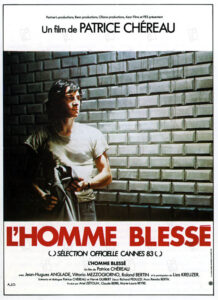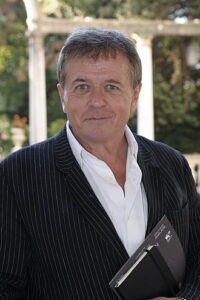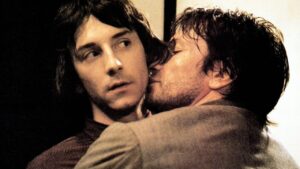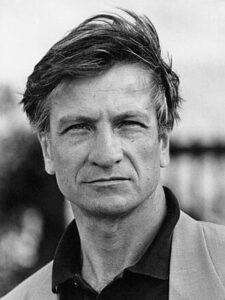The Wounded Man [L’Homme Blessé] ***½ (1983, Jean-Hugues Anglade, Vittorio Mezzogiorno, Roland Bertin) – Classic Movie Review 12,649
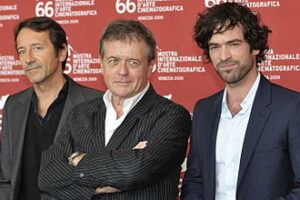
Jean-Hugues Anglade, Patrice Chéreau and Romain Duris at the Venice Film Festival in 2009, for Persécution.
Patrice Chéreau’s controversial, heavy-weight 1983 French film The Wounded Man [l’Homme Blessé] stars Jean-Hugues Anglade and Vittorio Mezzogiorno in a kind of obsessive love story between a teenage boy and an older man involved in prostitution.
The Wounded Man (French: l’Homme Blessé) is a controversial, heavy-weight 1983 French film directed by Patrice Chéreau, and written by him and Hervé Guibert. It stars Jean-Hugues Anglade and Vittorio Mezzogiorno in a kind of obsessive love affair between a teenage boy and an older man involved in prostitution, offering a very dark view in the 1983 context of HIV and AIDS. It won the César Award for Best Writing, and was entered into the 1983 Cannes Film Festival.
Jean-Hugues Anglade (28 the time) stars as a teenage boy, Henri, living at home with his controlly, anxious mother (Annick Alane), distant father (Armin Mueller-Stahl) and bored sister (Sophie Edmond), who begins a bizarre stalking sexual relationship with a manipulative older hustler/ pimp called Jean (Vittorio Mezzogiorno) whom he meets in cruising areas at a train station. Henri takes over Jean’s clothes (Ripley style) and takes on the role of hustler. Things don’t go well.
L’Homme Blessé is ultra-weird, provocative, even shocking, and way out there. It’s a head banger. It has the courage of its strange convictions, and it doesn’t hold back. There are explicit sexual scenes, but filmed so as to be very unsexy. It feels like an anti-sex film, and, made in the 1983 context of HIV and AIDS, that may be understandable. There are a few longueurs and repetitions, so a little tighter editing would help. But mostly it is compelling, even oddly mesmerising. Nevertheless, at the same time, it is an unpleasant film, quite hard to watch, and alienating. And 40 years on, it feels as fresh as a daisy, and totally modern, its power to shock and disturb undiminished.
In a very brave, full-on performance, Anglade really goes for it, and so does Mezzogiorno, with much less to do. Both men are very impressive. The film’s producer Claude Berri has a convincingly nasty role as Anglade’s client. Lisa Kreuzer plays Mezzogiorno’s sometimes live-in lover Elisabeth, and Armin Mueller-Stahl plays Anglade’s father. The two German film icons have disappointingly little to do, except be there, though their presences are welcome.
It’s very French, all a bit downbeat, degrading and depressing. It’s not exactly celebratory or life affirming, but then again what actually is it? Maybe it’s all a nightmare. It certainly all seems to unfold at night in a nightmarish, illogical fashion, with horror elements leading to a horrific ending. Is it an anti-coming-of-age story, advice on just want not to do, and a manual on how to get it so wrong?
Director: Patrice Chéreau. Writers: Hervé Guibert (scenario and dialogue), Patrice Chéreau (scenario and dialogue). L’Homme Blessé) is a more personal project for Chéreau. He and his co-writer, Hervé Guibert, worked for six years on the scenario. Despite this film, Chéreau said he was not interested in gay topics: ‘I never wanted to specialise in gay stories, and gay newspapers have criticised me for that. Everywhere love stories are exactly the same. The game of desire, and how you live with desire, are the same.’
Hervé Guibert (14 December 1955 – 27 December 1991) played a considerable role in changing French public attitudes to HIV/AIDS and his writing style was inspired by French writer Jean Genet. This is the context in which L’Homme Blessé can be viewed. Tragically he died of AIDS on 27 December 1991, aged only 36.
The cast are Jean-Hugues Anglade as Henri, Vittorio Mezzogiorno as Jean Lerman, Roland Bertin as Bosmans, Lisa Kreuzer as Elisabeth, Claude Berri as The client, Armin Mueller-Stahl as The father, Annick Alane as The mother, Sophie Edmond as The sister, Hammou Graïa as The station man, Gérard Desarthe as The man who cries, Denis Lavant, Maria Verdi, Suzanne Chavance, Roland Chalosse, Eddy Roos, and Charly Chemouny.
It is shot by Renato Berta, and scored by Fiorenzo Carpi.
Release date: 25 May 1983. Running time: 109 minutes.
Patrice Chéreau is best known for the 1994 historical romantic drama film La Reine Margot and Intimacy (2001), his only English-language film, based on short stories by Hanif Kureishi.
Chéreau was in a long-term relationship with actor Pascal Greggory. Chéreau died in Paris on 7 October 2013 from lung cancer, aged 68.
Jean-Hugues Anglade (born 29 July 1955) is known for Killing Zoe, Betty Blue and Nikita.
Italian actor Vittorio Mezzogiorno (16 December 1941 – 7 January 1994) died of cancer in Milan at the age of 52.
© Derek Winnert 2023 – Classic Movie Review 12,649
Check out more reviews on http://derekwinnert.com

